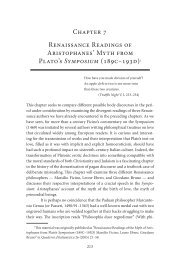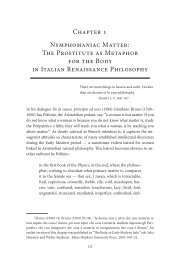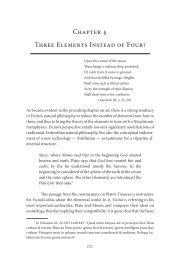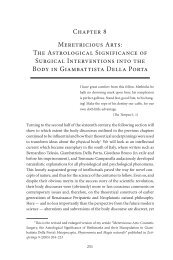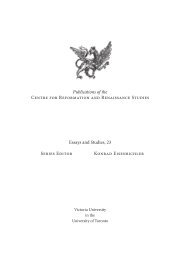Chapter 2 Matter as a Mirror: Marsilio Ficino and Renaissance ...
Chapter 2 Matter as a Mirror: Marsilio Ficino and Renaissance ...
Chapter 2 Matter as a Mirror: Marsilio Ficino and Renaissance ...
You also want an ePaper? Increase the reach of your titles
YUMPU automatically turns print PDFs into web optimized ePapers that Google loves.
106<br />
Disreputable Bodies<br />
the re<strong>as</strong>on that it does not remain on the surface of that thing<br />
but sinks into it. If it falls on something dense but rough, such<br />
<strong>as</strong> stones, bricks, <strong>and</strong> the like, because of the roughness of that<br />
body it is dissipated <strong>and</strong> broken up. But a mirror, on account<br />
of its hardness, stops the spirit on the surface; on account of<br />
the evenness <strong>and</strong> smoothness of its surface, it preserves it<br />
unbroken; on account of its brightness it aids <strong>and</strong> incre<strong>as</strong>es the<br />
spirit’s own ray; on account of its cold, it forces its very fine<br />
mist into droplets. 178<br />
We are here confronted with a highly compressed argument, <strong>as</strong> well<br />
<strong>as</strong> a complex range of ide<strong>as</strong>, which ultimately dates back to Aristotle’s short<br />
treatise on dreams. He says:<br />
For in the c<strong>as</strong>e of very bright mirrors, when women during<br />
their menstrual periods look into the mirror, the surface of the<br />
mirror becomes a sort of bloodshot cloud; <strong>and</strong> if the mirror is<br />
new, it is not e<strong>as</strong>y to wipe off such a stain, while if it is old it is<br />
e<strong>as</strong>ier. The cause is, <strong>as</strong> we said, that the eye is not only affected<br />
by the air, but also h<strong>as</strong> an effect upon it <strong>and</strong> moves it – <strong>as</strong> bright<br />
objects do (for the eye is a bright object <strong>and</strong> h<strong>as</strong> colour). Now<br />
it is re<strong>as</strong>onable that the eyes, like any other part whatsoever,<br />
should be affected during the menstrual period; for they are<br />
veined by nature. That is why, when the menstrual discharges<br />
occur because of a disturbance <strong>and</strong> bloody inflammation, the<br />
178 Trans. <strong>Ficino</strong> (1985) 160, De amore, VII, 4: II, 247–279: “Scribit Aristoteles, mulieres<br />
qu<strong>and</strong>o sanguis menstruus defluit, intuitu suo speculum sanguineis guttis saepe foedare.<br />
Quod ex eo fieri arbitror, quia spiritus, qui vapor sanguinis est, sanguis quidam<br />
tenuissimus videtur esse, adeo ut <strong>as</strong>pectum effugiat oculorum, sed in speculi superficie<br />
factus cr<strong>as</strong>sior clare perspicitur. Hic si in rariorem materiam aliquam, ceu pannum aut<br />
lignum incidat, ideo non videtur quia in superficie rei illius non restat, sed penetrat. Si in<br />
densam quidem, sed <strong>as</strong>peram, sicuti saxa, lateres et similia, corporis illius inequalitate dissipatur<br />
et frangitur. Speculum autem propter duritiem sistit in superficie spiritum; propter<br />
equalitatem lenitatemque servat infractum; propter nitorem, spiritus ipsius radium iuvat<br />
et auget; propter frigiditatem, rarissimam illius nebulam cogit in guttul<strong>as</strong>.” For another<br />
quotation in <strong>Ficino</strong>, see OO 941: “Atque Aristoteles, inquit, mulierem in purgatione menstrui<br />
sanguinis constitutam foedare sanguine quodam obiectum, speculum et imaginem.”<br />
See also Allen (1989) 190 n. 25. For a repetition of the same story, see Della Porta (1611)<br />
VIII, 15: 380–381.



